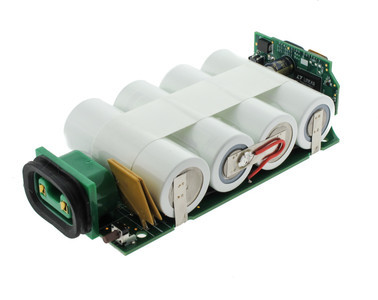When you consider and evaluate the true stresses that lithium batteries encounter, most battery packs are designed to last three to five years if used and stored properly. Environmental conditions, not just charge cycling, are the key factors for longevity. The worst situation is keeping a fully charged battery at elevated temperatures. When not in use, batteries must be stored in a cool place.
Most battery manufacturers recommend storing lithium battery packs at a 40% charge and being outside of the device it is used in. This allows for some self-discharge while still retaining sufficient charge to keep the protection circuit active. Elevated temperatures and/or allowing the battery to sit at the maximum charge voltage for extended periods of time are the most common reasons for shorter than expected battery life.
best options for storing lithium batteries
Test data confirms that the best storage option of lithium batteries is if the cell is partially discharged. In one test by Cadex Electronics (www.buchmann.ca) after 1 year in storage at 25°C, the non-recoverable capacity remaining is stellar 96% when stored at 40% initial charge level. By comparison, non-recoverable capacity was reduced to 80% when stored at 100% initial charge level. This effect is reduced at lower temperature and is a non-issue at 0°C but at higher temperatures the effect is much worse.

Lithium-ion Battery Pack with Sophisticated Control and Monitoring Electronics
If secondary cells or battery packs must be stored for a prolonged period, the state of charge should be checked regularly, and provision should be made for recharging the cells before the cell voltage drops below the recommended minimum after which the cells suffer irreparable deterioration. (This is particularly true for battery packs which may have associated electronics which add to the self-discharge drain on the cells.)
Lithium-ion battery chemistries ;prefer partial discharge, and since lithium-ion chemistry does not have a "memory", you do not harm the battery pack with a partial discharge. If the voltage of a lithium-ion cell drops below a certain level, it cannot recover. This is also part of the reason that you want to use fuel gauge technology on all battery packs so that you can actively measure capacity and extend the life of the battery pack.
Lithium-ion batteries age, even if they are sitting on a shelf unused, and this capacity decrease is irreversible. So do not "avoid using" the battery with the thought that it will extend battery life for years. It won't. Also, if you are buying a new battery pack, you want to make sure it really is new. If it has been sitting on a shelf in the store for a year, it won't last very long. Manufacturing dates are important to review when it comes to lithium battery storage.
Ready to learn beyond proper lithium battery storage? Check out our full battery pack development timeline.
Key Takeaways
- Environmental Conditions Trump Charge Cycles for Battery Life: The main factor affecting lithium battery longevity is not how often you use it, but how it's stored. High temperatures and being left fully charged are the most damaging conditions.
- Partial Charge Storage is Best for Long-Term Health: Storing lithium batteries at around 40% charge and in a cool environment (ideally around 25°C or lower) helps preserve capacity. Data shows 96% capacity retention after a year when stored at 40%, versus only 80% at full charge.
- Avoid Deep Discharge at All Costs: If a lithium cell’s voltage drops too low, it may become unrecoverable. Periodically checking and recharging stored batteries helps prevent irreversible damage, especially in packs with built-in electronics that slowly drain power.
- Lithium Batteries Naturally Degrade Over Time: These batteries age even when unused. Avoid “saving” a battery for later, as shelf time contributes to irreversible capacity loss. Always verify the manufacturing date before purchasing.
- Use Fuel Gauge Technology to Maximize Usable Life: Battery packs with integrated monitoring help track charge levels accurately, prevent deep discharge, and extend operational life by ensuring cells remain within safe voltage ranges.















